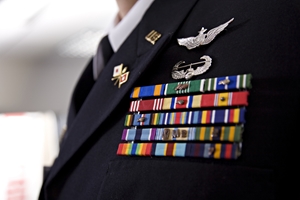Life after service can be a stressful time for veterans. The rhythms and cadences of civilian life are vastly different from the rigor of military life, which may require some mechanisms to cope with the stresses of daily life and the residual scars from the battlefield. Luckily, there are various ways for returning veterans to manage their stress, and some might be more surprising than others.
Ceramic art represents crafty way to manage stress
According to the Daily Sundial, arts therapy is an outlet for veterans who seek to vent pent-up stress. The source noted that a recent arts therapy workshop was run by a Marine Corp veteran, Thomas Dang, who also has a Master's in Fine Arts, which allows him to be supple in straddling the worlds of art and the more rigorous world of the military. The program garnered accolades from military men and women who participated in it, lending credence to the holistic benefits of certain kinds of arts and crafts.
Physicality is key in warding off anxiety
Military.com noted that an excellent way for veterans to diminish feelings of anxiety is to participate in physical sports. The source suggested that sports like jogging and tennis can be an excellent way to loosen feelings of anxiety. A more low-key sport such as golf may not be the best option here, however, as greater exertion will help create a more positive outlook on problems. Returning soldiers have to contend with various factors, such as obtaining army life insurance, that may create stress. Therefore, knowing what to do when stress sets in can be essential.
Yoga a viable resource in contending with stress
Yoga can also help veterans deal with feelings of stress. According to Reuters, many specialists have suggested that yoga can help diminish symptoms of post traumatic stress disorder.
"You want to feel comfortable with your instructor, especially if you're new to this – you want to know that they'll come around and help you align and feel comfortable with them doing that so you don't hurt yourself and also you have a more positive experience if you feel connected with the instructor," said Michelle Hamilton of the National Center for PTSD at the VA Boston Healthcare System, according to Reuters.
Hamilton's comments shed light on the necessity of veterans forming solidarity with instructors and others after military service. While this may be arduous, there are certainly benefits to be had in developing a closer relationship to a yoga instructor, working on establishing bonds and trust. The Veterans Administration Boston Healthcare system even cited a story in which a Vietnam veteran, who suffered from PTSD, was able to sleep better after he pursued yoga to help relieve stress. While no solution is a panacea, veterans may be sanguine about the benefits yoga presents.
Meditation helps veterans grapple with negative feelings
"All these practices are designed to foster a calm, non-judgmental awareness of your sensations and feelings," said Dr. Autumn Gallegos, a researcher at VA's Center of Excellence for Suicide Prevention, according to the Veterans Administration. "We call it Mindfulness-Based Stress Reduction. The idea is to be present in the moment, to be fully aware and alive. And if you can do that, you can choose how you're going to respond to unpleasant events or memories. You become the captain of your own ship."
The source noted that meditation practices like mindfulness can help bring a veteran suffering from anxiety to feel more calm and tranquil, avoiding the deleterious effects of stress. Yoga often links up with this type of meditation, allowing a veteran to combine stress-releasing activities to help regain an inherent sense of placidness in oneself.

